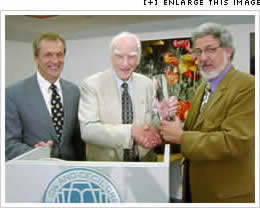Francis Crick Wins First 'Life Sciences Achievement Award' From UCSD's Division Of Biological Sciences
JUNE 18, 2003
Media Contact: Kim McDonald (858) 534-7572
The University of California, San Diego's Division of Biological Sciences today bestowed its inaugural Life Sciences Achievement Award on Francis H.C. Crick, a Nobel Prize-winning biologist who 50 years ago was instrumental in elucidating the double-helical structure of DNA, an achievement many scientists regard as the most important biological discovery of the 20th century.
Crick, the J.W. Kieckhefer Distinguished Research Professor at the Salk Institute for Biological Studies, was presented with the $25,000 award at a luncheon ceremony at UCSD's Faculty Club by Chancellor Robert C. Dynes and Eduardo R. Macagno, Dean of the Division of Biological Sciences.
Inspired by the university's growing reputation as a leader in research and education, Macagno created the division's Life Sciences Achievement Award to "recognize individuals whose research contributions have added significantly to the understanding of the basic science of life."
"There are many reasons to commemorate the human endeavor and the contributions of the practitioners who are responsible for the punctuation marks in history," said Macagno. "It is through such recognition that we acquire a sense of community and tradition. It provides the fabric of a field and defines its character. Francis Crick epitomizes many of the characteristics that are hallmarks of a great scientist and what the Division of Biological Sciences looks for in our young students."
In 1953, Crick and three other scientists-Maurice Wilkins, Rosalind Franklin and James Watson-discovered the structure of DNA, the molecule that makes possible the transmission of inherited characteristics. For that achievement, Crick, Watson and Wilkins shared the 1962 Nobel Prize in Physiology or Medicine.
This year's Life Sciences Achievement Award and a symposium in April hosted by the UCSD's Division of Biological Sciences celebrating "DNA and the Legacy of Molecular Biology" were financed by a $50,000 gift to the division from Merck & Co., Inc.

